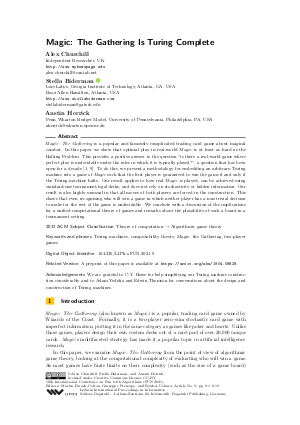Magic: The Gathering Is Turing Complete
Authors
Alex Churchill,
Stella Biderman  ,
Austin Herrick
,
Austin Herrick
-
Part of:
Volume:
10th International Conference on Fun with Algorithms (FUN 2021)
Part of: Series: Leibniz International Proceedings in Informatics (LIPIcs)
Part of: Conference: International Conference on Fun with Algorithms (FUN) - License:
 Creative Commons Attribution 3.0 Unported license
Creative Commons Attribution 3.0 Unported license
- Publication Date: 2020-09-16
File

PDF
LIPIcs.FUN.2021.9.pdf
- Filesize: 491 kB
- 19 pages
Document Identifiers
Related Versions
-
A preprint of this paper is available at https://arxiv.org/abs/1904.09828.
Subject Classification
ACM Subject Classification
- Theory of computation → Algorithmic game theory
Keywords
- Turing machines
- computability theory
- Magic: the Gathering
- two-player games
Metrics
- Access Statistics
-
Total Accesses (updated on a weekly basis)
0Document
0Metadata
Abstract
Magic: The Gathering is a popular and famously complicated trading card game about magical combat. In this paper we show that optimal play in real-world Magic is at least as hard as the Halting Problem. This provides a positive answer to the question "is there a real-world game where perfect play is undecidable under the rules in which it is typically played?", a question that has been open for a decade [David Auger and Oliver Teytaud, 2012; Erik D. Demaine and Robert A. Hearn, 2009]. To do this, we present a methodology for embedding an arbitrary Turing machine into a game of Magic such that the first player is guaranteed to win the game if and only if the Turing machine halts. Our result applies to how real Magic is played, can be achieved using standard-size tournament-legal decks, and does not rely on stochasticity or hidden information. Our result is also highly unusual in that all moves of both players are forced in the construction. This shows that even recognising who will win a game in which neither player has a non-trivial decision to make for the rest of the game is undecidable. We conclude with a discussion of the implications for a unified computational theory of games and remarks about the playability of such a board in a tournament setting.
Cite As Get BibTex
Alex Churchill, Stella Biderman, and Austin Herrick. Magic: The Gathering Is Turing Complete. In 10th International Conference on Fun with Algorithms (FUN 2021). Leibniz International Proceedings in Informatics (LIPIcs), Volume 157, pp. 9:1-9:19, Schloss Dagstuhl – Leibniz-Zentrum für Informatik (2020)
https://doi.org/10.4230/LIPIcs.FUN.2021.9
BibTex
@InProceedings{churchill_et_al:LIPIcs.FUN.2021.9,
author = {Churchill, Alex and Biderman, Stella and Herrick, Austin},
title = {{Magic: The Gathering Is Turing Complete}},
booktitle = {10th International Conference on Fun with Algorithms (FUN 2021)},
pages = {9:1--9:19},
series = {Leibniz International Proceedings in Informatics (LIPIcs)},
ISBN = {978-3-95977-145-0},
ISSN = {1868-8969},
year = {2020},
volume = {157},
editor = {Farach-Colton, Martin and Prencipe, Giuseppe and Uehara, Ryuhei},
publisher = {Schloss Dagstuhl -- Leibniz-Zentrum f{\"u}r Informatik},
address = {Dagstuhl, Germany},
URL = {https://drops.dagstuhl.de/entities/document/10.4230/LIPIcs.FUN.2021.9},
URN = {urn:nbn:de:0030-drops-127706},
doi = {10.4230/LIPIcs.FUN.2021.9},
annote = {Keywords: Turing machines, computability theory, Magic: the Gathering, two-player games}
}
Author Details
- LucyLabys, Georgia Institute of Technology, Atlanta, GA, USA
- Booz Allen Hamilton, Atlanta, USA
Acknowledgements
We are grateful to C-Y. Howe for help simplifying our Turing machine construction considerably and to Adam Yedidia and Edwin Thomson for conversations about the design and construction of Turing machines.
References
-
David Auger and Oliver Teytaud. The frontier of decidability in partially observable recursive games. International Journal of Foundations of Computer Science, 2012.

- Stella Biderman and Bjørn Kjos-Hanssen. Non-comparable natural numbers. Theoretical Computer Science Stack Exchange, 2018. URL: https://cstheory.stackexchange.com/q/41384.
-
Krishnendu Chatterjee and Rasmus Ibsen-Jensen. The complexity of deciding legality of a single step of Magic: The Gathering. In 22nd European Conference on Artificial Intelligence, 2016.

- Alex Churchill. Magic: The Gathering is Turing complete v5, 2012. URL: https://www.toothycat.net/~hologram/Turing/.
- Alex Churchill et al. Magic is Turing complete (the Turing machine combo), 2014. URL: http://tinyurl.com/pv3n2lg.
-
Michael J. Coulombe and Jayson Lynch. Cooperating in video games? Impossible! Undecidability of team multiplayer games. In 9th International Conference on Fun with Algorithms, 2018.

-
Erik D. Demaine and Robert A. Hearn. Playing games with algorithms: algorithmic combinatorial game theory. In 26th Symp. on Mathematical Foundations in Computer Science, pages 18-32, 2001.

-
Erik D. Demaine and Robert A. Hearn. Constraint logic: A uniform framework for modeling computation as games. In 2008 23rd Annual IEEE Conference on Computational Complexity, pages 149-162, 2008.

-
Erik D. Demaine and Robert A. Hearn. Games, Puzzles, and Computation. CRC Press, 2009.

-
Alexander Esche. Mathematical Programming and Magic: The Gathering. PhD thesis, Northern Illinois University, 2018.

-
Eugenio Fortanely. Personal communication, 2018.

-
H. G. Rice. Classes of recursively enumerable sets and their decision problems. Trans. Amer. Math. Soc., 74:358–366, 1953.

-
Yurii Rogozhin. Small universal Turing machines. Theoretical Computer Science, 168(2):215-240, 1996.

-
Colin D. Ward and Peter I. Cowling. Monte Carlo search applied to card selection in Magic: The Gathering. In CIG'09 Proceedings of the 5th international conference on Computational Intelligence and Games, pages 9-16, 2009.

-
Colin D. Ward, Peter I. Cowling, and Edward J. Powley. Ensemble determinization in Monte Carlo tree search for the imperfect information card game Magic: The Gathering. In IEEE Transactions on Computational Intelligence and AI in Games, volume 4, 2012.

- Wizards of the Coast. Magic: The Gathering comprehensive rules, August 2018. URL: https://magic.wizards.com/en/game-info/gameplay/rules-and-formats/rules.
- Wizards of the Coast. Magic: The Gathering tournament rules, August 2018. URL: https://wpn.wizards.com/sites/wpn/files/attachements/mtg_mtr_21jan19_en.pdf.
